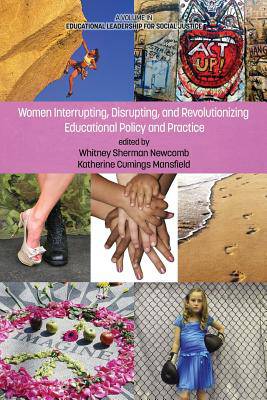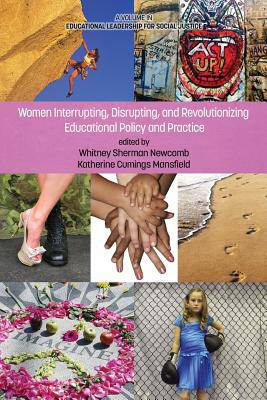
- Afhalen na 1 uur in een winkel met voorraad
- Gratis thuislevering in België vanaf € 30
- Ruim aanbod met 7 miljoen producten
- Afhalen na 1 uur in een winkel met voorraad
- Gratis thuislevering in België vanaf € 30
- Ruim aanbod met 7 miljoen producten
Women Interrupting, Disrupting, and Revolutionizing Educational Policy and Practice
Omschrijving
The idea for this book was born from discussions at several recent academic events including the Women Leading Education (WLE) International Conference in Volos, Greece (2012) and the University Council for Educational Administration (UCEA) Conference in Pittsburgh, Pennsylvania (2011) as well as from informal dialogue amongst ourselves and various colleagues, both new and veteran to the field of educational leadership and, in particular, dedicated to the study of women in leadership. At both the WLE Conference and the UCEA Conference, we heard frustration from veteran women in the field that the study of women in leadership is stagnant and has not moved forward in several years; with scholars new to the field continuing to write and publish work about barriers to aspiring and practicing women leaders (the same types of reports that began the "formal" inquiry into women's lives as leaders back in the 1980s) without being able to push forward with "new" information or ideas for change. In essence, the concerns and questions that were posed from some veteran women were: Why are we continuing to report the same things that we reported 30 years ago?; Why are we still talking about barriers to women in leadership?; and Why haven't we moved past gender binaries in regard to leadership ideas and practice? Considering these questions, some women new to the field countered with their own set of responses and questions that included: Is it not significant to report that some women are still experiencing the same types of barriers in leadership that were highlighted 30 years ago?; Is it accurate to report that all women's voices have now been heard/represented?; and How can we report something different if it hasn't happened?
The discussions that have ensued between veteran women and those new to the field inspired us to develop a book that situates women in leadership exactly where we are today (and reports the status of girls who are positioned to continue the "good fight" that began many years ago) and that both highlights the changes that have occurred and reports any stagnancy that continues to threaten women's positionality in educational leadership literature, practice, and policy. It forefronts the voices of women educational scholars who have (and are) interrupting, disrupting, and revolutionizing educational policy and practice. Our book reports women's leadership activities and knowledge in both the k-12 and university settings and concludes with chapters ripe with ideas for pushing for change through policy, advocacy, and activism. The final chapter presents themes that emerged from the individual chapters and sets forth an agenda to move forward with the study of women in leadership.
Specificaties
Betrokkenen
- Uitgeverij:
Inhoud
- Aantal bladzijden:
- 358
- Taal:
- Engels
- Reeks:
Eigenschappen
- Productcode (EAN):
- 9781623967031
- Verschijningsdatum:
- 3/06/2014
- Uitvoering:
- Paperback
- Formaat:
- Trade paperback (VS)
- Afmetingen:
- 156 mm x 234 mm
- Gewicht:
- 498 g

Alleen bij Standaard Boekhandel
Beoordelingen
We publiceren alleen reviews die voldoen aan de voorwaarden voor reviews. Bekijk onze voorwaarden voor reviews.








